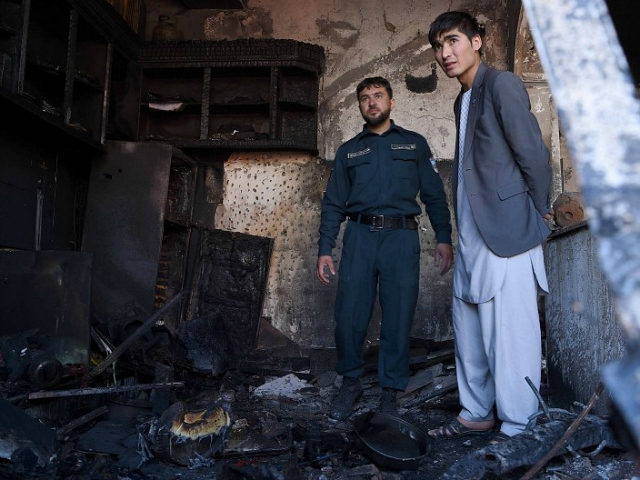A Taliban jihadist killed about 29 people and wounded 40 others in a suicide car bombing Monday that targeted Afghan intelligence staff onboard a bus in the country’s capital of Kabul, but it ended up murdering and wounding civilians, including women and children.
“Several cars were destroyed and small shops that lined the busy street were decimated and many of the occupants within killed,” reports the Associated Press (AP). “The suicide bomber had rammed his explosive laden car into a minibus carrying employees of the mines and petroleum ministry, said Kabul police chief spokesman Basir Mujahed.”
In a statement claiming responsibility for the attack, Taliban spokesman Zabiullah Mujahid acknowledged that the terrorist group’s target was a bus carrying Afghan intelligence personnel. However, Afghan Interior Ministry spokesman Najib Danish told CNN all the victims were civilians, including some Ministry of Mining and Petroleum workers. He also revealed that women and children were among the injured.
While the death toll varies by news outlet, the number of people injured is consistent at about 40.
The Taliban is believed to have killed between 24 and 36 people; AP places the death toll at 24, CNN at 29, and Afghanistan’s TOLO News at 36.
“Every day people are dying,” Amir Helam, whose friend died in Monday’s explosion, reportedly told TOLO News.
Addressing the U.S.-backed government, he added, “If you cannot bring peace, then please leave and bring other people.”
To the Taliban, Helam also said, “Please come and talk with the government. It is enough, stop killing the people.”
The attack took place during the capital’s morning rush hour in a neighborhood that various prominent politicians call home, prompting residents and analysts to question the U.S.-backed government’s ability to protect Kabul.
Both the Taliban and its rival the Islamic State (ISIS/ISIL) have targeted Kabul in recent months.
Monday’s attack took place as government employees and students made their way to work and school.
On May 31, near the beginning of Islam’s holiest month of Ramadan, the Afghan capital experienced its worst suicide attack since the U.S. overthrew the Taliban regime in 2001.
The Taliban-linked Haqqani Network killed about 150 people and injured more than 300 others.
It was the deadliest attack of this year’s Ramadan, when Islamic extremist groups encourage its supporters to engage in jihad and become martyrs.
“Our fight is Jihad & obligatory worship, [the] reward for every obligatory act of worship is multiplied x70 in #Ramadan,” wrote Mujahid, the Taliban spokesman, on Twitter on the first full day of the holy month (May 27).
Security conditions in Afghanistan have been deteriorating since the previous U.S. administration, and NATO pulled out most of their troops and declared their combat mission over at the end of 2014.
The U.S. did grant the authority to some American troops in Afghanistan to serve in a limited counterterrorism role. About 8,400 American forces are currently in the country. The majority of them are serving as advisors and trainers.
By the end of former President Barack Obama’s administration, the U.S. was obliged to face the facts on the ground and increase airstrikes and approve the deployment of additional troops.
President Trump inherited a mess in Afghanistan from his predecessors. The president has been forced to intensify the U.S. air war even further, dropping more bombs (at least 1,634) already this year than during all of 2015 and 2016. Moreover, the Trump administration has increased pressure on Pakistan, which the Pentagon has long accused of providing sanctuary to the Taliban and its Haqqani Network affiliate, a charge that Islamabad denies.
As mandated by U.S. law enacted near the end of the Obama administration, Trump’s Pentagon is withholding millions of U.S. taxpayer funds in military reimbursements from Pakistan over Islamabad’s support to the Haqqani Network.
Neighboring Pakistan has condemned Monday’s attack, saying that “terrorism is a common enemy.”
The Trump administration is working on developing an Afghan war strategy.
Although it may involve the deployment of additional troops, Breitbart News has learned that President Trump has made it clear that he is not willing to implement a plan that resembles the failed ones of the past.
Afghan President Ashraf Ghani’s administration dismissed Monday’s attack as “a criminal act against humanity.”
“Once again, these terrorist are attacking civilians and targeting government staff,” declared Ghani said in a statement.
Kabul is the epicenter of high levels of corruption that is fueling terrorism in war-ravaged Afghanistan.
Afghan security forces and civilians continue to bear the brunt of the nearly 16-year-old war in Afghanistan. The Taliban is responsible for the majority of casualties in Afghanistan.
However, the conflict is not immune to unfortunate incidents such as friendly fire attacks when forces are accidentally struck by their allies and insider, or “green on blue” assaults, when members of Afghan security forces intentionally target their own side.
Currently, the United States military is investigating a U.S. airstrike Friday that killed 16 Afghan police officers and injured two others instead of the terrorists it was targeting.
U.S. confirms Afghan casualties resulting from airstrike pic.twitter.com/DPlPd95nPb
— USFOR-A Spokesman, Col Dave Butler (@USFOR_A) July 21, 2017

COMMENTS
Please let us know if you're having issues with commenting.